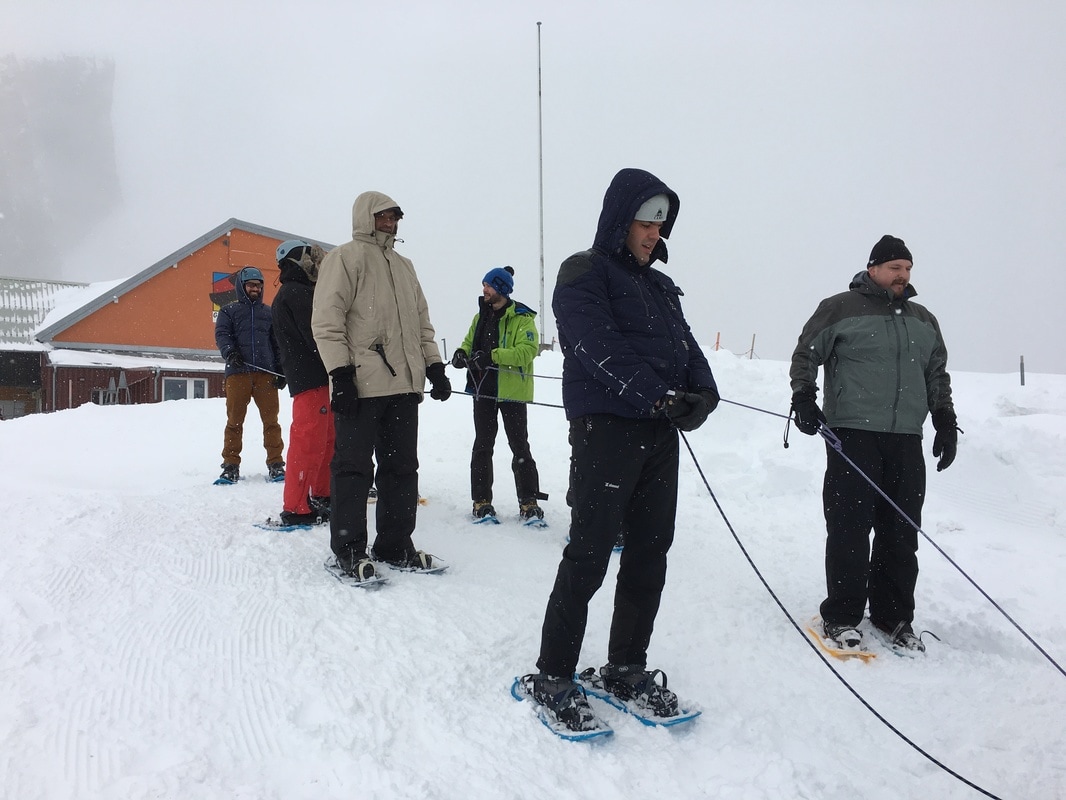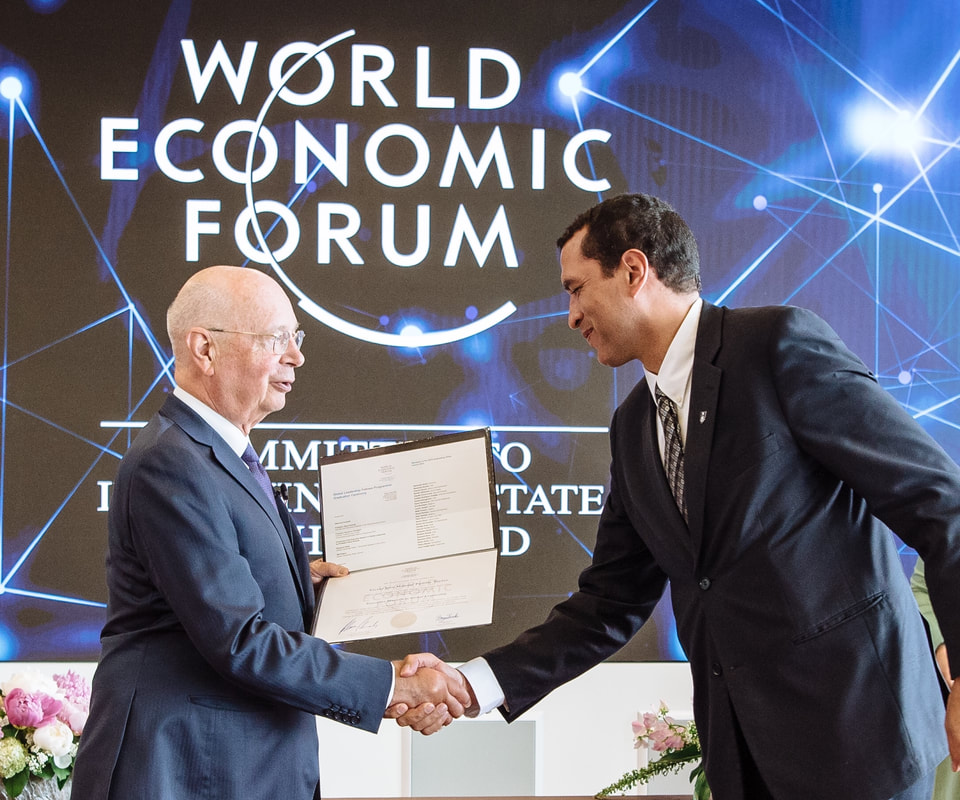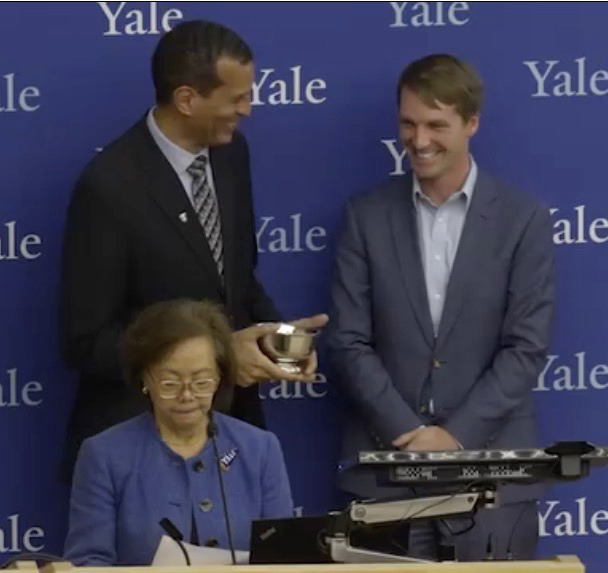There is nothing more practical than good theory
|
In a world that has turned more fractured than before, working at the World Economic Forum as a Global Leadership Fellow (GLF) has given me opportunities to re-evaluate globalization both at the existential and instrumental levels. At the existential level, I see a world that currently seems to be going back to tribalism. The Forum has responded directly to this trend by pointing out to the consequences of a world that moves away from shared values and interests. But there is another instrumental level where globalization is also being recalibrated: leadership and management styles are becoming more fluid because past and highly valued Western values are not recognized anymore as the only benchmarks for success. For every Apple and Facebook out there, there is an Alibaba and WeChat now.
In this context, the Forum has truly been a unique place of professional and personal learning that only a few other places in the world can also be. Every year, the Forum selects a few candidates amongst 6000+ applications to take part in its unique Global Leadership Fellows Programme, which combines intensive work with inspiring learning experiences around the world. The programme is developed in partnership with INSEAD, The Wharton School, Columbia University, London Business School, China Europe International Business School and THNK School of Creative Leadership over the course of three years. And its design and delivery are based on the «Agile Servant Leader» framework, which helps participants to develop self-awareness, a global mindset, contextual intelligence, and the ability to think and intervene systemically in business and societal issues. Grateful for this incredible opportunity, I graduated from the programme on May 2018 with an Executive Master's in Global Leadership. As a Global Leadership Fellow (GLF), I have changed multiple times my management roles and styles to serve many of our diverse communities. After all, I knew back in 2015 that I had joined the Forum ‘to improve the state of the world’, not to improve the state of ‘my world’. And even though I also knew about the importance of multi-stakeholder collaboration, I quickly realized that the convening power of this international organization provided me with an incomparable opportunity to create sustainable impact where business and society meet and work together. I learned to ‘map the issues’ and to identify proper institutional interventions that have the power to make our global systems healthier. I learned systems leadership, its mindsets, approaches and tools. If you are a leader for business and society (this is the ‘motto’ of my business school at Yale University), there is no shortage of diversity of action at the Forum: from community engagement to project management; from idea generation to insight curation; and from content creation to knowledge dissemination. I feel grateful for the trust I received to add, not to extract, to the Forum’s mission. Some of this work was uncharted territory for me and I grew in awareness of my choices as I traveled the new roads. And some of this work brought opportunities and the agency to shape my outcomes, even when navigating ambiguous objectives and unclear limits. After taking detailed stock of my everyday hustle during the past three years, which came on top of four hours of daily commute time between my home in New Haven, Connecticut, and New York City, I truly feel proud about these achievements and about how I managed to ‘struggle well’: • I interacted with senior executives of complex partner accounts and convinced them to increase their level of engagement in Forum activities. • I learned to manage and consolidate the outputs of the Forum’s Global Agenda Council on the Future of Logistics and Supply Chains in 2015-2016, which also led my team to entrust me with an evolved version of this group of cross-industry experts: the Global Future Council on the Future of Mobility, whose 25 members I personally interviewed, nominated and onboarded. • I facilitated the public-private dialogue of experts from the Global Agenda Council with officials from the Government of Panama, which included a mission trip to the country to scope the activities needed to deploy a Logistics Control Tower. • As a facilitator of an impactful public-private partnership supporting the humanitarian community, I contributed to the expansion of activities of the Logistics Emergency Teams to include disaster preparedness in addition to its emergency response relief and assistance during complex crises. • I assisted the Logistics Emergency Teams during the 2017 flooding crisis in Peru by facilitating the coordination efforts between this partnership and the government. • I contributed to the design and delivery of a three-day training workshop in May 2017 for a group of employees of the Logistics Emergency Teams to prepare them to respond to natural disaster crises. • I participated in the creation and promotion of new narratives to communicate the efforts of the Logistics Emergency Teams activities. • I scoped the ideation of a new social impact project by organizing two sessions at Forum events (India Economic Summit 2016, Annual Meeting 2017) which ultimately led to its internal approval and support of two Forum Project Advisors who presented bids to launch my idea. • I coordinated internal Forum resources and those of Deloitte Consulting LLC to deliver the objectives for a project dealing with ‘transportation poverty’ (SIMSystem: Designing Seamless Integrated Mobility). • I organized three dynamic project workshops on ‘transportation interoperability’ in the cities of Berlin, New York and Japan; I also organized and delivered sessions at an Industry Strategy Officers meeting, two Annual Meetings, one Summit of Global Agenda Councils, two Summits of Global Future Councils and workshops at Mexico City (Enabling Trade), Miami and Dubai (LET training) and New York (launch of Community for Effective Humanitarian Response). • I coordinated the internal Forum resources and those of the consulting firm Bain & Company to deliver the objectives of a trade facilitation project (Enabling Trade: Unlocking the Potential of Mexico and Vietnam). • I presented the Enabling Trade Index framework to the Government of Mexico as an approach to their efforts to gain regulatory support for the implementation of the Bali trade agreement. • I supported the Head of Supply Chain and Transport in growing the Industry community of partner companies, Chief Executive Officers and Heads of Strategy • I contributed to the launch of the following publications: The New Silk Road, Idea and Concept; Digital Transformation of Industries, Logistics Industry; Enabling Trade, Unlocking the Potential of Mexico and Vietnam; How Technology Can Unlock the Growth Potential along the New Silk Road; Designing a Seamless Integrated Mobility System, A Manifesto for Transforming Passenger and Goods Mobility; Hurdles ahead along the “New Silk Road” (published in Financial Times), also published in the Forum’s Agenda website; “There's one wall Mexico could break down” (published in Business Insider). • I supported via coaching three female members of the Mobility team on the topic of constructive feedback. • I collaborated on the translation to Spanish of the First Edition of “The Fourth Industrial Revolution” book written by the Chairman Klaus Schwab; and • I collaborated with Human Resources to represent the Forum at recruiting events at Yale University. For all these activities, I became a quicker learner, more analytical, more tactful in my communications with others, a better listener and an active examiner of the truth. Often I needed to restrain my overconfidence and leave it out the door. But I recognize that I would not have been able to perform as described above, in the mature and tempered manner often required during stressful situations, without the support and guidance of internal and external coaches and mentors, colleagues and my GLF peers sharing this exciting journey. Now that I have graduated from the GLF programme, the year of 2018 finds me feeling more passionate about social impact. I hope to continue ‘connecting the dots’ between systemic issues with the help of my acquired systems thinking practice. I trust that with good communications skills, along with my improved storytelling, the next chapter will bring me closer to more opportunities to pitch internally and externally new ideas for the betterment of society. I have become a believer of the theory of change that system leaders encourage. Sustainable change is not about mission accomplished, it is about creating healthy systems. It is not just about seeing problems; it is also about recognizing patterns. And it is not just about planning and control; we need the capacity to learn and adapt. I want to continue traveling the journey of a systems leader, who acts holistically and moves away from compartmentalized approaches. Systems leaders push for the search of the hidden causes underneath the visible aspects of a problem, decipher its related trends through time and intervene with modest but carefully designed actions to achieve meaningful and sustainable impact. The world can be a place of discovery through the application of systems leadership. And this practice can help us give people a sense of agency, direction, hope and collective purpose. For this incredible journey, after assessing my numerous lessons learned, I clearly find that the World Economic Forum is truly a unique place for advanced contextual learning.
1 Comment
(Gemmi Pass, Switzerland) Reaching the summit at GEMMI was an indulgence, an act of rebellion, and extreme political act. While there, I was able to reflect about my own identity as a leader along my peers from the Global Leadership Fellowship Programme. What a privilege! And yes, reflection nowadays is a political act that is much need in our world. The mountains, the snow storms, the silent walks and the group exercises: all things provided me with valuable opportunities to intensely reflect on both my personal and group identities.  Running exercises during GEMMI with people I care much about, and playing together ‘in the arena’ under uncommon circumstances that broke down a few, allowed us to abandon the type of violence that politeness causes in many groups. This unhelpful politeness impedes the joint experimentation on how to express our full range of emotions with the proper amount of energy. Particularly, I tend to exert too much of this energy, and many times I need to remind myself of not overreacting. So, while honoring my own experience, we came together to share this safe space and a deep sense of freedom that provided us with a glimpse to more real group interactions, where our stories as global leaders became demystified. GEMMI was indeed a place where you can prove that leading others and self-awareness is a contact sport. I was relieved to find out that other members of my cohort are in the same path as mine. Many of us want to ‘get high’, or do ground-breaking work. We are impatient about it, and we are seeking this experience with urgency. We are restless and desiring the autonomy and ownership for this type of work that we think can be more impactful. Salary conditions are important, but only as a baseline. We leave or stay in our jobs not because of our current conditions or the past, but because of our future prospects. Emotions matter. At GEMMI I found out again that this statement is true even when you share your life with people from different cultures than yours. Or, maybe it is in these situations that emotions matter the most. Our feelings often have layers that usually hide the truth about the impact of our interactions. So, in our safe space in the mountains, we practiced how to peel down these emotional layers to separate the modes of communications that are helpful from those that are unhelpful. For example, ‘feeling frustrated’ turned out to be an unhelpful phrase to use when disclosing emotions, or when providing feedback to others. At GEMMI, my multi-cultural cohort used experimentation in real life human interactions as a key rule of engagement. These interactions were not like those well-contained simulations where you expect to suffer some ‘gotcha moments’. Our interactions were something else. Our coaches facilitated multiple 1-on-1s and group-think exercises to expand our emotional intelligence capacities. And we did the rest and extracted so much learning. In my case, curiosity proved to be the greatest antidote to reduce the natural tensions that were created. Curiosity proved helpful. Unhelpful behaviors that I tried to stop were: to assume my usual roles as a manner of ‘surviving’ my group interactions; to mindfully take the sidelines in group discussions to let others take control; and, to let myself be bored with topics not so relevant to me. The invitation from our coaches to actively engage with others with a ‘now and here’ attitude did result an act of generosity for others. So I practiced how to use my space and how to be present without overreaching or disempowering others. This constant attention to our surroundings is not an easy thing to hold. It can be stressful to us sometimes and it definitely takes a toll over our stamina. Yet I learned, or rather remembered from my Basketball years, that practice makes perfect. Truly engaging with others while receiving or giving feedback was a gift to our group, even if many times these were hard things to do. It is tough to receive feedback, especially when it is somewhat unhelpful. Yet without enough stress, learning stops. Each of us has that sweet spot to find. We only need to be mindful of our personal limits, because too much of it can also dampen learning. The final lesson from GEMMI, as an experience helping me to build my personal theory of interpersonal and group dynamics, was realizing the importance of taking the space you are given in life. When I did not own my space, others occupied it and filled it with assumptions of my motives. In my particular case, since I was given feedback of my strong presence in the group, I noticed that others would interpret my reservations to guide with apprehension, distrust and even fear. My plan to yield my space to others while trying to be a team player was misunderstood and negatively viewed. In the past, I have feared to consume too much airtime in group settings or to be seen as patronizing when leading others. After receiving this Johari’s window feedback, I have found a reason to continue seeking how to regulate myself between the extremes of forcing my leadership and abandoning it. My coach even told me that it was always better to fail on the side of using your leadership. I am called to speak up while empowering others. This is in consonance with my past life story, which I also reviewed with my coach. Intentionally exercising my principled leadership giving a premium to active listening does not mean to be quiet or passive. And it surely does not mean to abandon the arena. I can, in fact, speak up and simultaneously give to others the power of the last word, the power to call their shots. But it takes practice. Experimentation, not perfection, will produce the fluidity that I long for my personal leadership. If I want to improve in using, managing, identifying and understanding emotions, I must be willing to fail along the way. In conclusion, making sense of what happened at GEMMI is easier when I demystify the experience of it. Personal reflections do not need to happen exclusively in such high places. My everyday interactions can make up for an arena where my willingness to experiment and learn with others can bring about the needed insights for my career. Practice will make perfect, or not. Finding and holding ground in these everyday spaces both in my workplace and personal life will surely have the potential to increase my leadership impact. |
AuthorVictor Padilla-Taylor is Director of Networks at the Tsai Center for Innovative Thinking at Yale. He was the 2021 recipient of the Linda Lorimer Award for Distinguished Service, conferred by Yale’s president on staff who have demonstrated their commitment to innovative thinking and the educational and research missions of the university. He also serves as board leader at Global Consortium for Entrepreneurship Centers, Long Wharf Theatre, Yale SOM Alumni Advisory Board, and Saint Thomas More Chapel and Center at Yale University. For his accomplishments as alumni volunteer, he received the 2023 Yale Alumni Leadership Award for his service and innovative leadership as nominated and selected by alumni relations staff members. AlpsBoundA global soul with MBA experience from GNAM schools around the world Archives
October 2023
Categories
All
|


 RSS Feed
RSS Feed